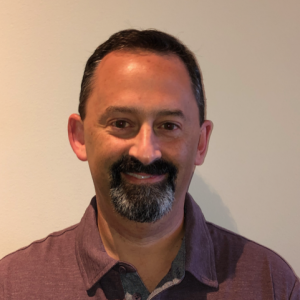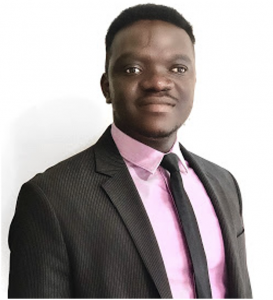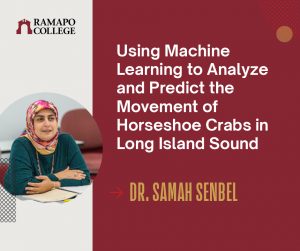- About Ramapo
- Academics
- Admissions & Aid
- Student Life
- Athletics
- Alumni
- Arts & Community
- Quick Links
- Apply
- Visit
- Give
Center for Data, Mathematical, and Computational Sciences
July 2, 2022DMC Advisory Board Member - Keith Osani

Ramapo College’s Center for Data, Mathematical, and Computational Sciences welcomes Keith Osani to our Advisory Board! Our Advisory Board’s mission is to assist the Center in aligning our curriculum with industry needs and expectations, helping us to promote our curriculum, and guide us in developing our sponsored fieldwork experiences to our students.
Keith earned a BS in Computer Science and Applied Physics from SUNY Albany and graduated from Ramapo College in 2022 with a Master’s Degree in Data Science. The
early part of his career was spent working as a consultant where he focused on custom software and web development for a variety of clients. For the last 20 years, Keith has worked in the music industry for Sony Music Group. Over the years with Sony, he has had the opportunity to work in royalties, digital supply chain and most recently data reporting and analytics. He is currently the Vice President of Data and Analytics in the Global Technology group. In this role, Keith leads a data engineering team responsible for the collection and storage of vast amounts of streaming consumption data reported by providers such as Spotify, Apple Music and Amazon. His team is also responsible for supporting Sony’s global community of analysts.
Categories: Data Science, MSCS, MSDS
April 15, 2022Grand Opening of the Center for Data, Mathematical, and Computational Sciences

Wednesday, April 27th at 6pm
ASB 123
Join us in opening the new Center for Data, Mathematical, and Computational Sciences. This research space serves as a place for graduate students and students in 4+1 programs to work in groups, deliver presentations, and hold team meetings. It’s a great place to hold faculty/student meetings and research discussions, and to invite our external partners to campus.
For more information contact Dr. Amanda Beecher (abeecher@ramapo.edu)
Categories: Data Science, MSCS, MSDS
March 22, 2022DMC Advisory Board Member - Yoav Nathaniel

Ramapo College’s Center for Data, Mathematical, and Computational Sciences welcomes Yoav Nathaniel to our Advisory Board! Our Advisory Board’s mission is to assist the Center in aligning our curriculum with industry needs and expectations, helping us to promote our curriculum, and guide us in developing our sponsored fieldwork experiences to our students.
Yoav Nathaniel was born in Israel and grew up in New Jersey, where he attended Ramapo College to study computer science. In 2015, while in school, Yoav joined Avanan, a cloud security startup that was later acquired by CheckPoint, as it’s first employee. Initially focused on QA for Avanan’s product, but later shifted to development, sales, marketing and cloud security thought leadership. Yoav later joined Goldman Sachs and led its firm wide cloud security engineering team, governing the cloud security standards of over 10,000 engineers. In early 2022, Yoav co-founded Silk Security to help security teams accelerate their remediation processes and save hours of work per week.
Categories: Data Science, MSCS, MSDS
February 15, 2022Multifractal Analysis of Daily US COVID-19 Cases

Wednesday, March 23rd at 6-7pm in ASB 323
In this talk we discuss how the multifractal detrended fluctuation analysis (MFDFA) technique can be used to explore the highly irregular behavior or volatility clustering of daily COVID-19 cases in the United States. By using the multifractal spectrum of the MFDFA we will characterize the path and predict the short or long memory behavior of the US COVID-19 Cases on different time scales.
Biography: Osei Tweneboah is Assistant Professor of Data Science at Ramapo College of New Jersey. His main research is Stochastic Analysis, Machine Learning and Scientific Computing with applications to Big Data and Complex Data sets arising in Finance, Public Health, Geophysics, and others. Dr. Tweneboah is co-author of the textbook Data Science in Theory and Practice: Techniques for Big Data Analytics and Complex Data Sets recently published by Wiley.
Categories: Data Science, Lecture Series, MSDS
November 16, 2021Data is the new OIL - Slides and Thank you
Thank Arnab Mukhopadhyay for his insightful overview of how corporations view data, and how that view has evolved. In case you missed it, take a Data is the new OIL from the presentation.
Categories: Data Science, MSDS
August 27, 2021Using Machine Learning to Analyze and Predict the Movement of Horseshoe Crabs in Long Island Sound

Dr. Samah Senbel, Assistant Professor of Computer Science at Sacred Heart University will be describing her work on developing machine learning models to predict animal movement patterns. Please join us (virtually) on Monday, September 27th at 1pm to learn more about this important area of study in ecology, conservation and wildlife management.
Connection details will be provided after registration.
Abstract: Developing models to predict animal movement patterns is an important area of study in ecology, conservation and wildlife management. Models can be used to decipher patterns in mark-recapture data and machine learning can help to make predictions about future animal movement patterns. Project Limulus (PL), a community research program, has been tracking the movement of tagged individuals in the population of American horseshoe crabs (Limulus polyphemus) in Long Island Sound since 1997. During the spring spawning season, horseshoe crabs are captured by hand in spawning areas along the Connecticut (CT) shoreline, tagged and then released. Recaptured horseshoe crabs give valuable information about their behavior, if they exhibit site fidelity and movement patterns around the Sound. In this paper, we tested various models to find the best predictor for the movement of spawning horseshoe crabs to shorelines in the Sound based on the observed movement activity in previous years. The dataset consists of all the previous horseshoe crab movements: initial longitude and latitude, sex, initial date, and recapture longitude and latitude and recapture date. This dataset has 19,219 recapture records covering twenty years of activity. We experimented with three different models: Linear Regression, Decision Tree, and Random Forest Regression models. We used the data for 2018 as our test set and the data of all previous years as our training set. The Random Forest Regression model proved to be the best predictive model for animal movement and resulted in the smallest RMSE and MAE, as well as the smallest maximum error in prediction. The predicted horseshoe crab locations can be targeted in the next season for recapturing previously tagged horseshoe crabs, which provides valuable information about their movement patterns. It also concentrates the scientists’ effort and time to find the maximum number of horseshoe crabs.
This talk is supported by a grant from the Ramapo College Foundation.
Categories: Data Science, Lecture Series, MSDS
April 21, 2021MSDS Students at Scholars Week - College Football Recruiting Using Machine Learning Techniques
Colette Barca, Keith Osani, Nisha Srishan, and William “Brady” Wulster are inaugural members of the Master’s in Data Science program. During their MATH 570 Applied Statistics course with Professor Osei Tweneboah, they designed and completed a research project to predict high school football recruits’ college commitments using several Machine Learning techniques.
The four designed their project with the understanding that college football is big business. To create a winning team that will continue to generate revenue, Division I Football Bowl Subdivision (FBS) Power Five schools need to choose their recruits wisely. Recruits are selected
based on certain player attributes. Power Five schools are the most frequented schools by NFL scouts, making these schools highly desired by recruits. In this regard, Barca, Osani, Srishan, and Wulster built a model to predict whether a high school recruit will commit to a school in one of the Power Five Conferences. Such a model could allow a school to optimize its recruiting process, maximizing its return on investment. They used their dataset to fit several Machine Learning models. After completing the project, it was determined the Random Forest model produced the most accurate results. This model also revealed which particular attributes are indisputably the most important predictors of commitment to a Power Five school. This final model has the potential to be successfully used to improve the recruiting process.
Categories: Data Science, MSDS
April 25, 2020MSDS Fall course delivery options related to COVID-19
With uncertainty surrounding the upcoming Fall semester due to the COVID-19 pandemic, we want you to know our contingency plans in case of disruption.
All MSDS courses for the Fall 2020 semester are scheduled to be delivered as hybrid courses. This means a large portion of course content will be delivered online, however the course will meet once a week on campus. We’ve scheduled all three MSDS courses to meet on Thursday evenings.
There are two scenarios that could alter these plans:
- Ramapo College converts the Fall 2020 semester to online-only / remote delivery. In the unlikely event this happens, our hybrid format is well suited to move to 100% online, and our faculty have ample experience with this format. While we’d prefer to have the on-campus component, we will be well prepared and will still have a successful semester.
- Ramapo College holds on-campus courses as normal, however you, personally, are unable to be on campus. This could be because you are in a high risk category for COVID-19 and prefer not to attend in-person classes. This could also happen if you have difficulty obtaining a student visa to enter the United States due to delays related to the pandemic. In anticipation of these situations, we are committed to allowing students to attend the on-campus meetings virtually, through live stream or recording.
As we move through the summer and details of the Fall become more clear, we will provide additional details about remote delivery options.
Please stay safe, and we very much hope to see you in the Fall!
Categories: Data Science
February 10, 2020Ramapo adds new Mathematics faculty to support Data Science
Ramapo College is excited to welcome Matthew Jobrack to our Mathematics faculty.
Matthew Jobrack holds a B.S. in mathematics from Longwood University with a concentration in secondary education, a M.A. in mathematics from Appalachian State University, and a M.S in Statistics from Washington State University. He is currently a doctoral candidate in mathematics at Washington State University specializing in analytic number theory, with additional research interests in statistical wildlife population models. He has coauthored peer-reviewed publications in both mathematics and math education. He currently lives with his wife, daughter, 2 cats and 1 dog.
Categories: Data Science
January 13, 2020Ramapo welcomes new Data Science faculty member
Ramapo College is excited to welcome new Data Science faculty member Dr. Debbie Yuster. Dr. Yuster holds a B.A. in Mathematics with a concentration in Computer Science from Cornell, and a Ph.D. in Mathematics from Columbia, specializing in the field of Combinatorics.
Dr. Yuster joins us from SUNY Maritime College, where she has been a math professor for over a decade, earning accolades such as the SUNY Chancellor’s Award for Excellence in Teaching. Dr. Yuster served as a Visiting Data Science Scholar at the Wall Street Journal, and has cultivated industry partnerships leading to student research projects. She has authored peer-reviewed journal publications in mathematics, and has given numerous invited lectures. Dr. Yuster is also interested in K-12 STEM outreach, having worked with secondary school math teachers and students for many years. As part of Ramapo’s Data Science program, Dr. Yuster will teach courses in Data Science, Mathematics, and Computer Science.
Categories: Data Science
Copyright ©2024 Ramapo College Of New Jersey. Statements And Policies. Contact Webmaster.
